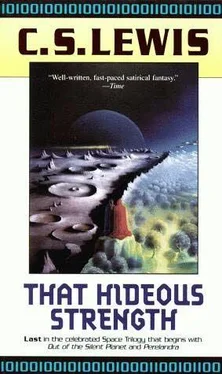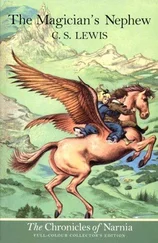Clive Lewis - That Hideous Strength
Здесь есть возможность читать онлайн «Clive Lewis - That Hideous Strength» — ознакомительный отрывок электронной книги совершенно бесплатно, а после прочтения отрывка купить полную версию. В некоторых случаях можно слушать аудио, скачать через торрент в формате fb2 и присутствует краткое содержание. Жанр: Религиоведение, Фэнтези, на английском языке. Описание произведения, (предисловие) а так же отзывы посетителей доступны на портале библиотеки ЛибКат.
- Название:That Hideous Strength
- Автор:
- Жанр:
- Год:неизвестен
- ISBN:нет данных
- Рейтинг книги:5 / 5. Голосов: 1
-
Избранное:Добавить в избранное
- Отзывы:
-
Ваша оценка:
- 100
- 1
- 2
- 3
- 4
- 5
That Hideous Strength: краткое содержание, описание и аннотация
Предлагаем к чтению аннотацию, описание, краткое содержание или предисловие (зависит от того, что написал сам автор книги «That Hideous Strength»). Если вы не нашли необходимую информацию о книге — напишите в комментариях, мы постараемся отыскать её.
That Hideous Strength — читать онлайн ознакомительный отрывок
Ниже представлен текст книги, разбитый по страницам. Система сохранения места последней прочитанной страницы, позволяет с удобством читать онлайн бесплатно книгу «That Hideous Strength», без необходимости каждый раз заново искать на чём Вы остановились. Поставьте закладку, и сможете в любой момент перейти на страницу, на которой закончили чтение.
Интервал:
Закладка:
“Pray make haste,” said Frost.
The quiet urgency of the voice and the fact that he had so often obeyed it before, almost conquered him. He was on the verge of obeying and getting the whole silly business over, when the defencelessness of the figure deterred him. The feeling was a very illogical one. Not because its hands were nailed and helpless, but because they were only made of wood and therefore even more helpless, because the thing, for all its realism, was inanimate and could not in any way hit back, he paused. The unretaliating face of a doll-one of Myrtle’s dolls-which he had pulled to pieces in boyhood had affected him in the same way, and the memory, even now, was tender to the touch.
“What are you waiting for, Mr. Studdock?” said Frost.
Mark was well aware of the rising danger. Obviously, if he disobeyed, his last chance of getting out of Belbury alive might be gone. Even of getting out of this room. The smothering sensation once again attacked him. He was himself, he felt, as helpless as the wooden Christ. As he thought this, he found himself looking at the crucifix in a new way-neither as a piece of wood nor a monument of superstition but as a bit of history. Christianity was nonsense, but one did not doubt that the man had lived and had been executed thus by the Belbury of those days. And that, as he suddenly saw, explained why this image, though not itself an image of the Straight or Normal, was yet in opposition to crooked Belbury. It was a picture of what happened when the Straight met the Crooked, a picture of what the Crooked did to the Straight-what it would do to him if he remained straight. It was, in a more emphatic sense than he had yet understood, a cross.
“Do you intend to go on with the training or not?” said Frost. His eye was on the time. He knew that those others were conducting their tour of inspection and that Jules must have very nearly reached Belbury. He knew that he might be interrupted at any moment. He had chosen this time for this stage in Mark’s initiation partly in obedience to an unexplained impulse (such impulses grew more frequent with him every day), but partly because he wished, in the uncertain situation which had now arisen, to secure Mark at once. He and Wither and possibly (by now) Straik were the only full initiates in the N.I.C.E. On them lay the danger of making any false step in dealing with the man who claimed to be Merlin and with his mysterious interpreter. For him who took the right steps there was a chance of ousting all the others, of becoming to them what they were to the rest of the Institute and what the Institute was to the rest of England. He knew that Wither was waiting eagerly for any slip on his own part. Hence it seemed to him of the utmost importance to bring Mark as soon as possible beyond that point after which there is no return, and the disciple’s allegiance both to the Macrobes and to the teacher who has initiated him becomes a matter of psychological, or even physical, necessity.
“Do you not hear what I am saying?” he asked Mark again.
Mark made no reply. He was thinking, and thinking hard because he knew that if he stopped even for a moment mere terror of death would take the decision out of his hands. Christianity was a fable. It would be ridiculous to die for a religion one did not believe. This Man himself, on that very cross, had discovered it to be a fable, and had died complaining that the God in whom he trusted, had forsaken him-had, in fact, found the universe a cheat. But this raised a question that Mark had never thought of before. Was that the moment at which to turn against the Man? If the universe was a cheat, was that a good reason for joining its side? Supposing the Straight was utterly powerless, always and everywhere certain to be mocked, tortured, and finally killed by the Crooked, what then? Why not go down with the ship? He began to be frightened by the very fact that his fears seemed to have momentarily vanished. They had been a safeguard . . . they had prevented him, all his life, from making mad decisions like that which he was now making as he turned to Frost and said, “It’s all bloody nonsense, and I’m damned if I do any such thing.”
When he said this he had no idea what might happen next. He did not know whether Frost would ring a bell or produce a revolver or renew his demands. In fact, Frost simply went on staring at him and he stared back. Then he saw that Frost was listening, and he began to listen himself. A moment later the door opened. The room seemed suddenly to be full of people-a man in a red gown (Mark did not instantly recognise the tramp) and the huge man in the black gown and Wither.
V
In the great drawing-room at Belbury a singularly uncomfortable party was by now assembled. Horace Jules, Director of the N.I.C.E . . . had arrived about half an hour before. They had shown him to the Deputy Director’s study, but the Deputy Director was not there. Then they had shown him to his own rooms and hoped he would take a long time settling in. He took a very short time. In five minutes he was downstairs again and on their hands, and it was still much too early for anyone to go and dress. He was now standing with his back to the fire drinking a glass of sherry and the principal members of the Institute were standing round him. Conversation was hanging fire.
Conversation with Mr. Jules was always difficult, because he insisted on regarding himself not as a figure-head but as the real director of the Institute, and even as the source of most of its ideas. And since, in fact, any science he knew was that taught him at the University of London over fifty years ago, and anything else he knew had been acquired from writers like Haeckel and Joseph McCabe and Winwood Reade, it was not, in fact, possible to talk to him about most of the things the Institute was really doing. One was always engaged in inventing answers to questions which were actually meaningless and expressing enthusiasm for ideas which were out of date and had been crude even in their prime. That was why the absence of the Deputy Director in such interviews was so disastrous, for Wither alone was master of a conversational style that exactly suited Jules.
Jules was a cockney. He was a very little man, whose legs were so short that he had unkindly been compared to a duck. He had a turned-up nose and a face in which some original bonhomie had been much interfered with by years of good living and conceit. His novels had first raised him to fame and affluence; later, as editor of the weekly called We want to Know he had become such a power in the country that his name was really necessary to the N.I.C.E.
“And as I said to the Archbishop,” observed Jules, “you may not know, my lord, said I, that modern research shows the temple at Jerusalem to have been about the size of an English village church.”
“God!” said Feverstone to himself, where he stood silent on the fringes of the group.
“Have a little more sherry, Director,” said Miss Hardcastle.
“Well, I don’t mind if I do,” said Jules. “It’s not at all bad sherry, though I think I could tell you of a place where we could get something better. And how are you getting on, Miss Hardcastle, with your reforms of our penal system?”
“Making real headway,” she replied. “I think some modification of the Pellotoff method”
“What I always say,” remarked Jules, interrupting her, “is, why not treat crime like any other disease? I’ve no use for punishment. What you want to do is to put the man on the right lines-give him a fresh start-give him an interest in life. It’s all perfectly simple if you look at it from that point of view. I dare say you’ve been reading a little address on the subject I gave at Northampton.”
“I agreed with you,” said Miss Hardcastle.
Читать дальшеИнтервал:
Закладка:
Похожие книги на «That Hideous Strength»
Представляем Вашему вниманию похожие книги на «That Hideous Strength» списком для выбора. Мы отобрали схожую по названию и смыслу литературу в надежде предоставить читателям больше вариантов отыскать новые, интересные, ещё непрочитанные произведения.
Обсуждение, отзывы о книге «That Hideous Strength» и просто собственные мнения читателей. Оставьте ваши комментарии, напишите, что Вы думаете о произведении, его смысле или главных героях. Укажите что конкретно понравилось, а что нет, и почему Вы так считаете.












